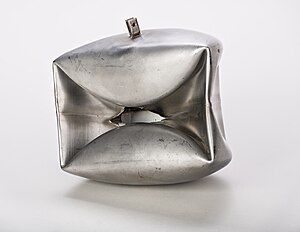
Hydraulic shock (colloquial: water hammer; fluid hammer) is a pressure surge or wave caused when a fluid in motion is forced to stop or change direction suddenly: a momentum change. It is usually observed in a liquid but gases can also be affected. This phenomenon commonly occurs when a valve closes suddenly at an end of a pipeline system and a pressure wave propagates in the pipe.
This pressure wave can cause major problems, from noise and vibration to pipe rupture or collapse. It is possible to reduce the effects of the water hammer pulses with accumulators, expansion tanks, surge tanks, blowoff valves, and other features. The effects can be avoided by ensuring that no valves will close too quickly with significant flow, but there are many situations that can cause the effect.
Rough calculations can be made using the Zhukovsky (Joukowsky) equation,[1] or more accurate ones using the method of characteristics.
- ^ Joukowsky, Nikolay (1900), "Über den hydraulischen Stoss in Wasserleitungsröhren" [On hydraulic shock in water pipes], Mémoires de l'Académie Impériale des Sciences de St.-Pétersbourg, 8th series (in German), 9 (5): 1–71